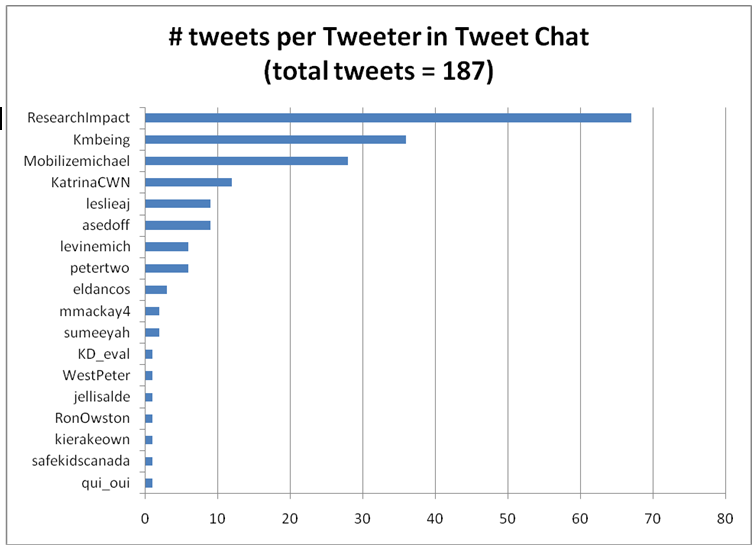The ResearchImpact tweet chat gave us a chance to explore this new use of twitter. 187 tweets in 60 minutes raised interest and allowed us to commit to another chat.
La séance tweeter organisé par le Réseau Impact Recherche nous a donné une chance d’expérimenter ce nouvel usage du populaire media. Les 187 gazouillis (tweets) en 60 minutes ont suscité beaucoup d’intérêt et ont mené à la planification d’une nouvelle séance.

On January 26, ResearchImpact-RéseauImpactRecherche hosted our first tweet chat. TweetChat happens in a tweet chat room and is identified by a specific hashtag, which for us was #KMbTaM. We posted the tweet chat announcement on January 19 on Mobilize This! and also on the KTE Community of Practice website. We had no idea what to expect. No one could show up and we could be tweeting to ourselves. Too many people could show up and it would be a cacophony of tweets.
As it turned out we had 18 tweeters who identified themselves in the tweet chat. Others might have been lurking and just listening in. If they didn’t tweet we couldn’t see them, but lurkers were welcome.
The 18 of us tweeted 187 tweets in the 60 minutes of the tweet chat. Some of us, like @ResearchImpact were heavy tweeters. Many contributed in a more modest fashion. See the chart below for all of the tweeters and their tweets. We specifically kept this first chat open rather than restrict to a single topic. We also decided that this would be a many-to-many tweet chat rather than the tweeters focusing their questions on one “authority”.
Three of us (@mobilizemichael, @asedoff, @ResearchImpact) were tweeting live in York’s KMb Unit and @KMbeing was skyped into tweet central. What we found strange was that while we were all sitting next to each other and all responding to each others’ tweets the room remained silent. We were so focused on reading and tweeting we forgot we could actually speak to each other. It also took about 20 seconds to respond to a tweet and 5 seconds to get the tweet to appear. After 25 seconds there were usually a couple of tweets appearing in the interim so it was sometimes hard to follow the thread as we would get multiple topics being discussed at once.
We also asked participants to complete a short survey to inform future tweet chats. We got 11/18 (61%) participants responding to the survey. There was 100% agreement that the tweet chat was useful (“Great idea. I love to have the opportunity to participate in more of them”). With respect to future chats, 46% of respondents thought the open forum format would be welcome and 73% (respondents were allowed to chose more than one response) thought a dedicated forum topic would be useful. We also lost one twitter follower over the hour of the chat. But then with such an activity in our twitter feed that’s not unexpected.
So what’s next?
We will hold another tweet chat, probably in March. It will be focused on a single topic and we may invite a KMb expert to serve as an authority.
This was a great experiment that seemed to meet the needs and interest of the participants and reinforces our commitment to expand our use of twitter and other social media to share information about knowledge mobilization.
